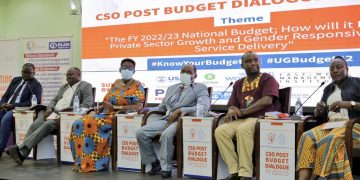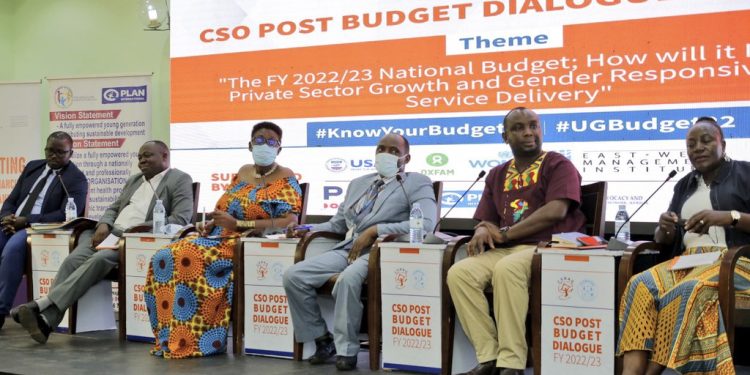Civil Society groups, under the umbrella Civil Society Budget Advocacy Group (CSBAG), have commended the government on its new key interventions in the FY2022/23 budget which they say will aid the speedy recovery of the economy and improve livelihoods.
Speaking on behalf of other CSOs at a CSO Post Budget Dialogue, Julius Mukunda, CSBAG Executive Director, said measures like no introduction of new taxes in the 2022/23 financial year and providing a pro-people rental tax will help revive the economy by reducing pressures on the few already constrained taxpayer.
He further noted that the decision to halt payment of Value Added Tax for suppliers to the government until they are paid will also help reduce the tax burden on private businesses supplying to Government and also control the accumulation of arrears by the Government.
Among other measures, Mukunda pointed to the full implementation of the Parish Development Model which he says will help transform the economy by targeting the 39 percent of households still in the subsistence economy.
“Enhancing the pay for our gallant security officers, scientists, medical workers, and science teachers will motivate the above cadres and improve service delivery. It will also avail a USD 217 million grant from the World Bank to support women entrepreneurs, among others,” he said.
Mukunda, however, noted that it is prudent that Public Finance Management is central in reigniting economic recovery, spurring private sector growth, and delivery of gender-responsive services.
He implored the government to address the public debt concern which he said is a ticking time bomb and also increase the consumptive nature of the budget and the readiness to deliver on public projects.
At the end of December 2021, Uganda’s national public debt stock stood at UGX 73.5 trillion representing a nominal Debt to GDP ratio of 49.7 percent.
This, Mukunda said, if not addressed, can derail Uganda’s development agenda.
“The high debt means little resources are available for service delivery. Therefore, we implore Government to prioritize the implementation of the Domestic Revenue Mobilisation Strategies through exploring the untapped potential revenue sources such as the digital economy and strengthening tax systems and administration. Such actions will widen the narrow tax base,” he said.
“Delivering services to the citizens requires that government cuts on the consumptive expenditures in the budget and prioritize allocations towards development budgets. For example, only UGX 14,565.9 billion (30%) of the FY2022/23 budget will go towards development expenditures, and UGX 20,626.3 billion towards recurrent expenditures (UGX 14,259.4 billion for non-wage and UGX 6,366.9 billion for Salaries and Wages). This clearly shows that as a country, we are not adjusting to the new normal of reducing consumptive budget expenditures and living in denial,” he added.
He appealed for 70 percent of the budget to be allocated toward development expenditures.
Hannington Ashaba, the Commissioner of Public Investment at the Ministry of Finance, Planning and Economic Development, said the government is committed to accelerating economic recovery to at least pre-pandemic levels by integrating more Ugandans into the money economy and speeding up growth in the country’s productive sector.
He said the budget presents enormous opportunities for the citizens and the private sector, urging Ugandans to adequately prepare themselves and take them up.









